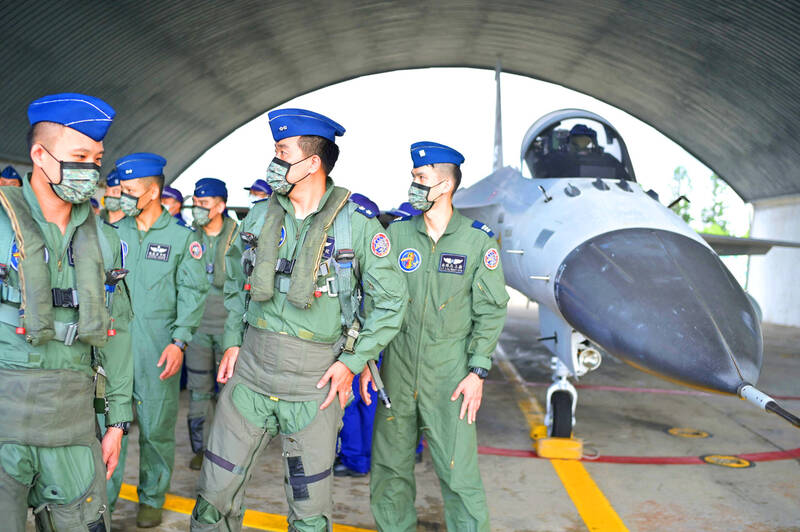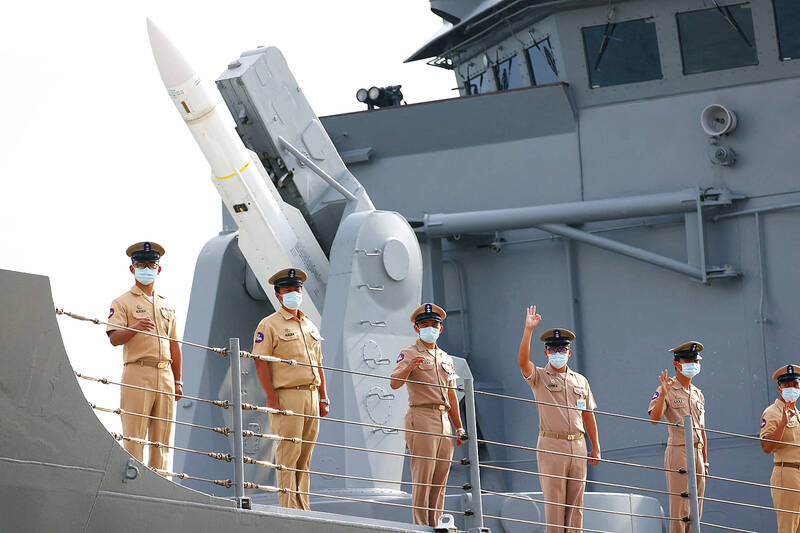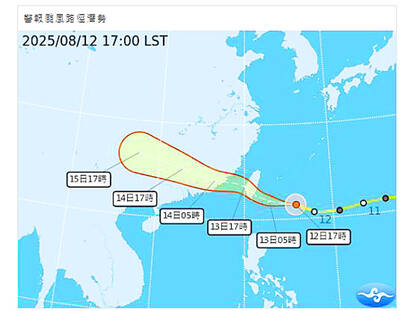The US is reportedly preparing to sell US$1.1 billion of missiles and radar support to Taiwan in what would be the largest such transfer in almost two years.
The package would include as much as US$650 million in continued support for a surveillance radar system sold earlier, about US$90 million for about 100 Sidewinder air-to-air missiles and about 60 additional anti-ship Harpoon missiles, a US official familiar with the matter said.
Both weapons have been sold to Taiwan previously.

Photo: Sam Yeh, AFP
The US Department of State late on Monday informally notified the US Congress of the sale.
The Ministry of National Defense yesterday said that information regarding US arms sales would be made public once the White House has formally notified Congress.
The Chinese Ministry of Foreign Affairs did not immediately respond to a request for comment on the planned sale, which was reported by Politico earlier on Monday.

Photo: Reuters
The notification marks the beginning of several weeks of staff consultations that are to result in a formal proposal from the State Department.
A separate person familiar with the matter said there have been several conversations between the White House and Congress about arms sales to Taiwan.
A spokesperson for the US National Security Council, who asked not to be identified, declined to respond in detail and said only that the US would continue fulfilling its responsibilities under the Taiwan Relations Act.
A State Department spokesperson said that as a matter of policy, it does not publicly comment or confirm proposed defense sales until they have been formally sent to Congress.
The sale would be the largest since a US$2.4 billion deal including Harpoon missiles in October 2020 and the largest since US President Joe Biden took office.
The Biden administration has to date announced five arms package sales to Taiwan — the first on Aug. 4 last year for 40 M109A6 “Paladin” self-propelled howitzers, which the ministry later turned down saying it was looking for alternatives.
The US in May told the ministry that the delivery of an artillery system would be delayed due to a “crowded” production line.
On Feb. 7, the US announced the sale of engineering support for the Patriot missile system for US$100 million; on April 5 it announced Patriot missile technical support valued at US$95 million; a naval components and technical support package for US$120 million was offered on June 8; and US$108 million for component support for the army and its vehicles was announced on July 15.
All of the sales this year have focused on logistics and components, with no mention of new equipment.
Institute for National Defense and Security Research fellow Su Tzu-yun (蘇紫雲) said that mainstream US opinion leans toward the possibility of a Chinese attack on Taiwan before 2027.
Taiwan’s limited defense budget cannot support the acquisition of sufficient equipment that it could deploy in time to mitigate the Chinese threat, Su said.
The US government has arrived at a cross-department consensus that selling Taiwan precision munitions can, in the interim, bolster its combat capabilities, he said.
Such a consensus would not be overturned unless Taiwan continues to increase its defense spending, at which point Taiwan could possibly ask for US sales of equipment such as warships and other platforms, he said.
President Tsai Ing-wen (蔡英文) yesterday said that she has instructed the armed forces to take “strong countermeasures” when necessary to protect Taiwan’s airspace.
Tsai, who was visiting troops in Penghu County, reaffirmed the nation’s stance that it would not provoke or start a war with China, and has refrained from taking more aggressive militarily moves.
However, that does not mean Taiwan would not counter Chinese provocations, especially when China is sending drones to Taiwan’s outlying islands and conducting cognitive warfare to undermine morale, she said.
Additional reporting by CNA

DEFENSE: The first set of three NASAMS that were previously purchased is expected to be delivered by the end of this year and deployed near the capital, sources said Taiwan plans to procure 28 more sets of M-142 High Mobility Artillery Rocket Systems (HIMARS), as well as nine additional sets of National Advanced Surface-to-Air Missile Systems (NASAMS), military sources said yesterday. Taiwan had previously purchased 29 HIMARS launchers from the US and received the first 11 last year. Once the planned purchases are completed and delivered, Taiwan would have 57 sets of HIMARS. The army has also increased the number of MGM-140 Army Tactical Missile Systems (ATACMS) purchased from 64 to 84, the sources added. Each HIMARS launch pod can carry six Guided Multiple Launch Rocket Systems, capable of

GET TO SAFETY: Authorities were scrambling to evacuate nearly 700 people in Hualien County to prepare for overflow from a natural dam formed by a previous typhoon Typhoon Podul yesterday intensified and accelerated as it neared Taiwan, with the impact expected to be felt overnight, the Central Weather Administration (CWA) said, while the Directorate-General of Personnel Administration announced that schools and government offices in most areas of southern and eastern Taiwan would be closed today. The affected regions are Tainan, Kaohsiung and Chiayi City, and Yunlin, Chiayi, Pingtung, Hualien and Taitung counties, as well as the outlying Penghu County. As of 10pm last night, the storm was about 370km east-southeast of Taitung County, moving west-northwest at 27kph, CWA data showed. With a radius of 120km, Podul is carrying maximum sustained

Tropical Storm Podul strengthened into a typhoon at 8pm yesterday, the Central Weather Administration (CWA) said, with a sea warning to be issued late last night or early this morning. As of 8pm, the typhoon was 1,020km east of Oluanpi (鵝鑾鼻), Taiwan’s southernmost tip, moving west at 23kph. The storm carried maximum sustained winds of 119kph and gusts reaching 155kph, the CWA said. Based on the tropical storm’s trajectory, a land warning could be issued any time from midday today, it added. CWA forecaster Chang Chun-yao (張竣堯) said Podul is a fast-moving storm that is forecast to bring its heaviest rainfall and strongest

TRAJECTORY: The severe tropical storm is predicted to be closest to Taiwan on Wednesday and Thursday, and would influence the nation to varying degrees, a forecaster said The Central Weather Administration (CWA) yesterday said it would likely issue a sea warning for Tropical Storm Podul tomorrow morning and a land warning that evening at the earliest. CWA forecaster Lin Ting-yi (林定宜) said the severe tropical storm is predicted to be closest to Taiwan on Wednesday and Thursday. As of 2pm yesterday, the storm was moving west at 21kph and packing sustained winds of 108kph and gusts of up to 136.8kph, the CWA said. Lin said that the tropical storm was about 1,710km east of Oluanpi (鵝鑾鼻), Taiwan’s southernmost tip, with two possible trajectories over the next one